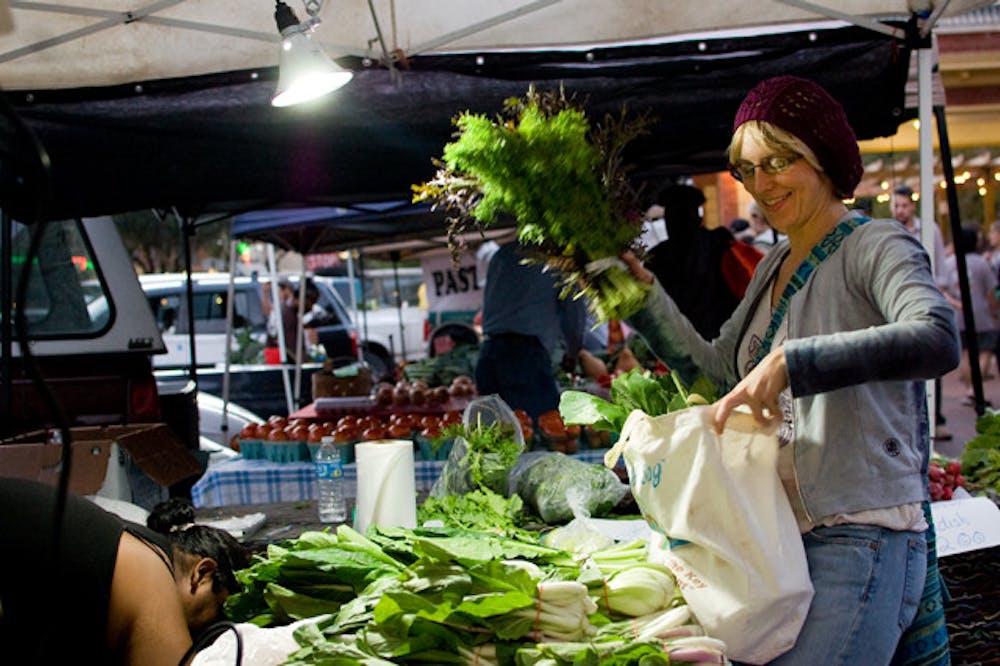The products sold at Gainesville farmers markets may not all come from local family-owned farms. They could be shipped from hundreds of miles away or even from other countries.
Gainesville is surrounded by a plethora of family-owned farms. But even with these options, wholesale and retail produce is sneaking its way into area farmers markets.
“They’re called peddlers,” said Sandy Rodgers, owner of Piney Woods Farm, which grows produce and flowers.
Peddlers, a common term among farmers, are people who buy produce from wholesale markets or retail grocers and resell them as fresh-picked goods at local farmers markets.
They may sell the retail produce exclusively or along with food they’ve grown.
Alexis Riffel, a fourth-year business major with a focus in sustainability, has shopped at farmers markets since her freshman year. But she just learned that not all of the vendors grow their produce.
Riffel buys her produce from The Family Garden, a family-owned farm in Gilchrist County that sells its products in Gainesville. She said they told her about the peddlers.
“They didn’t tell us who it was,” Riffel said. “They just told us to be wary if we go downtown.”
When asked about peddlers, most growers at Gainesville’s markets seemed immediately uncomfortable and refused to give any specific names or opinions. But Rodgers willingly spoke about the topic.
“There’s a pretty strong feeling among farmers about peddlers,” she said.
She knows people who sell wholesale goods at local markets, and she even used to do it at a small market in Keystone Heights.
Some customers walked away after learning they were retail goods, she said. Others didn’t care.
“They just want that pretty red tomato,” she said. “They don’t care where it comes from.”
She explained that in some cities, reselling can be profitable enough to live on.
Some peddlers resell from small family-owned farms, but others are selling food that comes from hundreds of miles away or even other countries.
Rodgers said she knew a reseller who buys food from Rainbow Produce, 2420 NE 19th Drive, and sells it at smaller markets outside of Gainesville.
Jack Maas, the owner of Rainbow Produce, said that up to 20 percent of what his store sells during harvest season, from about October until about June, is purchased from local farms.
“If it’s in season and it’s around, we’ll jump on it,” he said.
The rest mostly comes from California.
Gainesville has about 10 major farmers markets, each with about 20 to 40 vendors. Most vendors are growers, but peddlers are there, too.
Charlie Lybrand, founder and market manager of the Union Street Farmers Market downtown, said he has asked vendors to stop selling at his market because they weren’t growers.
“We’ve had issues and we’ve had to get rid of those people,” Lybrand said.
Vendors at the Union Street market monitor each other, he said. They usually alert him to any problems.
If consumers want to avoid buying from resellers, the best thing to do, according to Rodgers, is to ask questions.
Ask where the food was grown, where the farm is and who owns it. Some farms, like Kumarie’s Organic Garden located in Alachua, even allow customers to volunteer at the farm — helping grow the food they will eventually eat.
According to Riffel, it’s best to establish a relationship with a farmer and shop mostly from them. Since choosing to shop almost exclusively with The Family Garden, she said she couldn’t be happier.
The Alachua County Farmers Market is a county-enforced, growers-only market.
Consumers who shop there will buy their produce, dairy or meats from the farmers who produced it. It started in 1989 and is held every Saturday from 8:30 a.m. until noon.
Market manager Jared Sweat said because it’s a growers-only market, it’s different from other markets in the area. According to him, people who vend there are more personally involved in the product, which attracts consumers.
“Peddlers have a mentality that they just want to get rid of the produce,” he said. “Here, people actually care.”





